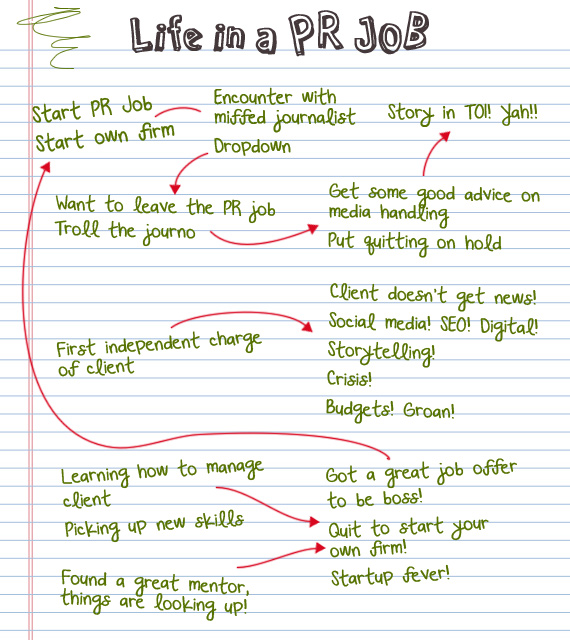Why your PR career is never a straight line
PR Insight
Paarul Chand
 Amitabh Bachchan, Laloo Prasad Yadav, Indira Gandhi post the emergency period – all great survivors who understood that their career will not be a straight line. We asked PR professionals about the ups and downs in their lives and what they learnt from it.
Amitabh Bachchan, Laloo Prasad Yadav, Indira Gandhi post the emergency period – all great survivors who understood that their career will not be a straight line. We asked PR professionals about the ups and downs in their lives and what they learnt from it.
Nitin Mantri, CEO, ‘Avian Media’ takes inspiration from French writer René Crevel who said, “Straight lines go too quickly to appreciate the pleasures of the journey.”
Mantri, who is also president- PRCAI, says, “How dreadful would it be if your career becomes a straight line? Wouldn’t that mean the end of the road? A curved line is what is needed as it signifies growth. Of course, there will be times when the curve dips, but that’s how you learn. This is especially true for PR as it is one career where the learning curve can swing up and the rewards are high for those who are willing to invest time in bettering themselves.”
Mantri took a non linear jump when he helped set up Avian Media, “I was a business director of a reputed group and responsible for client portfolios worth millions of dollars. From that to joining a relatively-unknown firm with five to six employees, a significant pay cut and operating out of a two-bedroom flat, was a difficult decision. It wasn’t a lucrative offer or an enchanting move – it was simply my decision to pursue an entrepreneurial path, a desire I had nurtured for long. The risk paid off, and today I can boast of creating something substantial, not only in terms of building a great company but also shaping careers.”
Neha K Bisht who was with ‘MSL Group’ earlier is currently in the very early stages of a similar journey and has been running her own firm ’Neha K Bisht Media Group’ for the last three months. Bisht says the move has given her tremendous confidence adding that, “Of course the security of a full time job makes you question your decision initially but then the drive to build brands like never before keeps you going.”

Facing multiple bosses in a PR job
DC Priyan, business head - south at Value 360 Communications agrees that a PR career can never be a straight line, with multiple stakeholders adding to the complexity. Says Priyan, “Ask any corporate employee from another profession as to who they are answerable to in their jobs. Most would reply saying it’s only their boss, in some cases it would be their boss and their clients. However, in the case of PR practitioners there exists an added dimension in the form of media, as we are heavily dependent on journalists and the media at large. This will give you an idea of the complexities of a profession that depends on multiple stakeholders.“
Explaining how this is a challenge, Priyan narrates two incidents, “In my career I recall a time when I was required to retain a particular client with the agency at any cost, while the client in reality did not have any news related material that they could offer the media. The task then for me and my team was to retain the client by providing other value based solutions such as content, media training modules. We managed to retain this account despite the absence of news material.“
Priyan also describes a situation, “Where we were once faced with a client who believed it was ethically wrong to give away media gifts. However, it was considered a norm in this city where the client was planning an event. Now how does one balance the whims and fancies of the client while ensuring success of the event and satiating the media at the same time?”
Anish George, assistant manager, Blue Lotus Communications agrees that its important to accept that a PR career will have more than its normal share of ups and down. While he managed to get huge attendance for the launch of a cheese product for a dairy company, he regards his experience handling a client dealing with online CAT Exams as a downward tick at work.
Says George, “For the first time IIM's were conducting CAT Exams online. There were lot of apprehensions and problems with the software in initial days of the CAT Exams. MBA aspirants were finding it difficult to use this new methodology of CAT exams. It was hectic for us as the client was initially based out of Singapore so it became more difficult to communicate with client. Media had extensively written negative on malfunctioning of system, technical problems in the testing rooms, problems in score inflation which had also caused embarrassment to IIMs. I wish we could have given a better PR plan and anticipated the problems of MBA aspirants which could have helped us to avert such a crisis situation.”
If you enjoyed this article, you can subscribe for free to our weekly event and subscriber alerts.
Featured

PR professionals share their views on journalists publicly calling them out on story pitches

Auto blogger renders unconditional apology to Value 360 for defamatory posts

Hottest Indian startups of 2020, Paytm, Dreams 11 lead the charge: Wizikey Report




